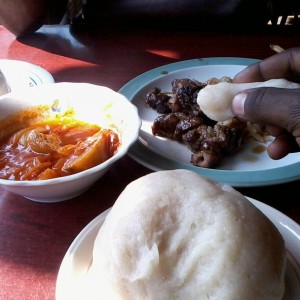Related Research Articles

The coat of arms of Burundi, adopted in 1966, consists of a shield surrounded by three spears. On the shield is the motto of the nation, as well as the head of a lion. Behind the shield there are three crossed traditional African spears. Under the shield the national motto of Burundi appears on a scroll: Unité, Travail, Progrès.

Burundi is a Central African nation that is closely linked with Rwanda, geographically, historically and culturally. The drum such as the karyenda is one of central importance. Internationally, the country has produced the music group Royal Drummers of Burundi.

Football in Burundi has been affected by the civil war that broke out in Burundi. Before that, Burundi football had been doing well. Football is the most popular sport in Burundi.

The Parliament of Burundi consists of two chambers:

The Football Federation of Burundi is the governing body of football in Burundi. It was founded in 1962, affiliated to FIFA in 1972 and to CAF in 1972. It organizes the national football league and the national team.
The Burundi national rugby union team represents Burundi in international rugby union. The nation are a member of the International Rugby Board (IRB) and have yet to play in a Rugby World Cup tournament. The Burundi national rugby team played their first international in 2003 - losing to Uganda. They participate annually in the CAR Castel Beer Trophy. However, in the 2007 tournament Burundi withdrew for financial reasons.

Burundi first participated at the 1996 Olympic Games, and has sent athletes to compete in every Summer Olympic Games since then. The nation has never participated in the Winter Olympic Games.

The Burundian passport is issued to citizens of Burundi for international travel.

Burundi sent a delegation to compete at the 2008 Summer Paralympics in Beijing, People's Republic of China. It was Burundi's first ever participation in the Paralympic Games. According to official records, the following three athletes competed in the games:

Burundi, officially the Republic of Burundi, is a landlocked country in the Great Rift Valley at the junction between the African Great Lakes region and Southeast Africa. It is bordered by Rwanda to the north, Tanzania to the east and southeast, and the Democratic Republic of the Congo to the west; Lake Tanganyika lies along its southwestern border. The capital city is Gitega and the largest city is Bujumbura.
Rugby union in Burundi is a minor but growing sport.

Diplomatic relations between the People's Republic of China and the Republic of Burundi were established on December 21, 1963, under Chairman Mao Zedong and King Mwambutsa IV Bangiriceng, respectively. King Mwambutsa broke off diplomatic relations with China in 1965, although they were restored under Michel Micombero the first President of Burundi, on October 31, 1971. Since then, China has provided development aid to Burundi, including helping with the construction of a textiles mill in Bujumbura. As of 2002, China exported $2.718 worth of goods, while importing only $491,000 worth of goods from Burundi. The current Chinese ambassador to Burundi is Feng Zhijun.

Burundi has issued postage stamps for national use since achieving independence on 1 July 1962. The country was formerly a part of the Belgian territory of Ruanda-Urundi and before 1962 used those postage stamps.

Burundi made its Paralympic Games début at the 2008 Summer Paralympics in Beijing, sending three male athletes to compete in racing events for arm amputees. None of them won a medal, although Rémy Nikobimeze did come fifth in the 5,000m race.

Burundi is situated in East Africa and has a territory full of mountains, savannas and agricultural fields, with forests in the surrounding rivers and waters. Agriculture is spread on 80% of the country's surface and it mainly includes coffee, tea, maize, beans and manioc. Due to these characteristics, Burundi cuisine is very representative of the African culinary culture, as it includes beans, which are the staple of Burundi cooking, exotic fruits, plantains, sweet potatoes, cassava, peas, maize and cereals, like corn and wheat.

Burundi competed at the 2012 Summer Olympics in London, United Kingdom from 27 July to 12 August 2012. This was the nation's fifth appearance at the Olympics.
Xaveri Burundi is a Catholic youth organization in Burundi. Xaveri Burundi is part of the African Xaveri Movement and a member of the Catholic youth umbrella organization Fimcap.
The Baptist Union of Burundi is a Baptist Christian denomination in Burundi. It is affiliated with the Baptist World Alliance. The headquarters is in Bujumbura.
COVID-19 vaccination in Burundi is an ongoing immunisation campaign against severe acute respiratory syndrome coronavirus 2 (SARS-CoV-2), the virus that causes coronavirus disease 2019 (COVID-19), in response to the ongoing pandemic in the country. Burundi was one of the last nation states in the world to commence vaccination against COVID-19. This was mostly due to the government's refusal to vaccinate the population throughout most of 2021. In February 2021, Thaddee Ndikumana, the health minister of Burundi, said his country was more concerned with prevention measures. "Since more than 95% of patients are recovering, we estimate that the vaccines are not yet necessary," local media reported.
Capital punishment was abolished in Burundi on 24 April 2009. Burundi is not a state party to the Second Optional Protocol to the International Covenant on Civil and Political Rights. The last legal execution in Burundi took place in 1997.
References
- ↑ Eggers, Ellen K. (2006). Historical Dictionary of Burundi. Scarecrow Press. p. 167. ISBN 978-0-8108-5302-7.
